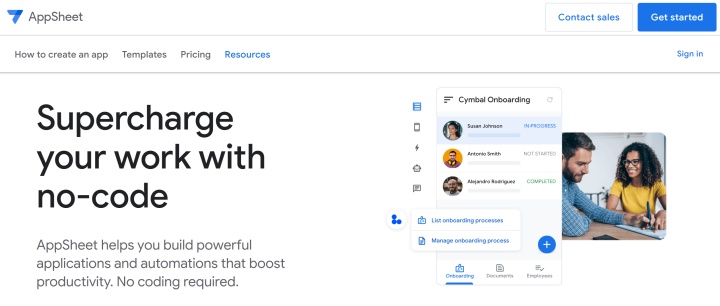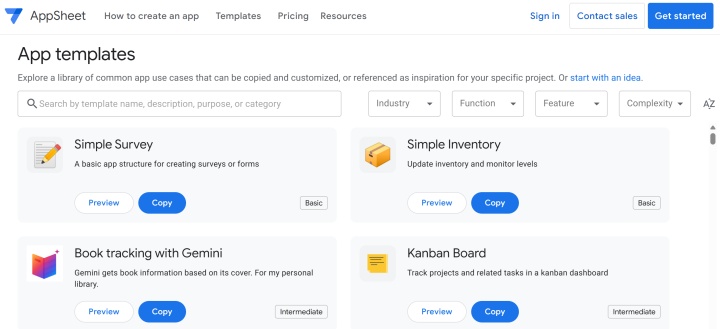AppSheet Uncovered: Empowering No-Code App Development for Everyone
The popularization of artificial intelligence technologies has spurred the development of no-code services in many areas. Programming is one of the priority areas among them. Today, there are many no-code development platforms on the market, with Google AppSheet holding a notable position. This review explains what AppSheet is, highlights its main tools and use cases, and shows how to get started.
What Is AppSheet
AppSheet is a no-code app development and automation platform owned by Google. Its users can create full-fledged software without any special skills using a range of built-in tools, including the Gemini AI assistant.
AppSheet lets you develop desktop and web applications, as well as software for mobile devices or tablets, using various data sources—from Google Sheets and Microsoft Excel to SQL databases. The platform can be used through a web interface, a mobile application, or as an add-on for Google Forms and Google Docs.
The product was first released by developer Praveen Seshadri in March 2014 and received its first investment from New Enterprise Associates a year later. In January 2020, AppSheet was acquired by Google, integrating it into its ecosystem of services.

Source: AppSheet
As of 2025, the platform's tools are available as part of most paid Google Workspace plans, allowing small teams to freely create and distribute apps. Large teams and companies can access its features and products directly by purchasing an AppSheet subscription and purchasing an AppSheet Core license, which is automatically included in some Workspace Enterprise editions.
Google AppSheet pricing includes the following plans:
- Starter ($5/month per user, basic application development and automation options, integration with spreadsheets and cloud storage, built-in database).
- Core ($10/month per user, all Starter features + advanced app development and automation options, app security management, email support).
- Enterprise Plus ($20/month per user, all Core capabilities + integration with cloud databases, SaaS services, APIs, and enterprise data services; advanced security and team management tools, machine learning modeling, priority support).
Key Features and Capabilities
Now that you know what Google AppSheet is and what it is used for, let's move on to a quick overview of the main features and tools of this platform.
Data Collection, Integration, and Visualization
Users can upload many types of data here, including images, forms, geolocations, barcodes, electronic signatures, etc. AppSheet supports integration with a number of native and third-party systems, including Google Workspace services (Gmail, Sheets, Apps Script, Chat, Drive), Office 365, Dropbox, Salesforce, BigQuery, SQL databases, Apigee, REST APIs, and OData. Uploaded data is easily visualized in various formats: tables, forms, calendars, maps, dashboards, etc.
No-Code Software Development
The platform allows you to create desktop, mobile, and web applications (including chatbots) without any special skills. For this purpose, it offers a built-in AI assistant, Gemini, which can be controlled through short text queries in the dialog interface. Moreover, users have the opportunity to add AI algorithms directly to the functionality of their products.
Application Customization
After developing an application from scratch or based on one of the many templates, AppSheet helps you flexibly customize its functionality and interface. Available options include both design customization (uploading a logo and other branding elements) and refinement of the technical component of the software.
Automation
Another important tool of the platform allows you to automate a wide range of processes and tasks. In particular, creating automatic email/SMS/push notifications, developing complex processes with conditional logic, triggers, and branching, implementing AI and ML technologies, and automating requests/responses using Google Apps Script functions.
If you are exploring workflow automation, also try our ApiX-Drive service. This tool allows you to set up integrations in no-code mode without any special knowledge or skills.
Templates
The built-in library of AppSheet templates makes it easier and faster to get the application you need without having to create it from scratch. All templates in the catalog are organized by a number of criteria: industry, purpose, functions, and complexity. Most popular among them are software for inventory management, creating surveys and forms, tracking projects, managing tasks, tracking deliveries, creating lists, online calendars, etc.
Collaboration and Security
Users can share data and develop applications together with their colleagues. In addition, the platform has a number of built-in security options, including user authentication, data encryption, role and permission management. There is also the ability to set restrictions for software and create application/data management policies or choose from an extensive library.
How AppSheet Transforms Business Processes
The AppSheet app builder makes the software development process much easier, faster, and more convenient for both businesses and individuals. With its help, anyone can create desktop, mobile, and web applications at a professional level, using them for different purposes: commercial, work, or personal.

Source: AppSheet
Below we will present to your attention some areas for which it is possible to develop software using this platform:
- Task management and project tracking. The platform allows you to create applications with tools for collaborative work on projects, task distribution and deadline setting, and communication between team members.
- Customer relationship management (CRM). Services of this type help businesses maintain a centralized customer base and coordinate all interactions with them. They can also be used to generate and manage leads, as well as stimulate sales.
- Training and staff preparation. Thanks to the following category of software, entrepreneurs can create online training courses, filling them with educational content, exercises, and tests to consolidate the results. In addition, this includes specialized programs for training and onboarding company employees.
- Data storage and management. Google AppSheet is an effective no-code tool for developing systems for storing and managing information. These include various catalogs, cloud storage, spreadsheet services, and full-fledged databases.
- Inventory and resource management. Another popular area of business applications helps to optimize and automate a number of operations related to the accounting of goods, orders, payments, and deliveries.
- Expense tracking and budgeting. These apps help entrepreneurs and individuals track their income and expenses, as well as plan and budget for projects or other purposes.
- Event management. This category of software contains tools for planning and organizing online and offline events, accounting for participants, sending out invitations, and managing their budgets and resources.
- Analytics and data visualization. Finally, an equally popular area is software for analyzing and visualizing data from various sources. With its help, businesses receive detailed reports with key metrics and personalized insights based on processed data.
Getting Started with AppSheet
To create your own app using the AppSheet no-code builder, follow these steps:
- Log in. The platform supports various login options, including Google, Microsoft, Dropbox, Smartsheet, Box, and Salesforce accounts. You can also access AppSheet Core tools through a paid Google Workspace subscription.
- Create an app. Users are offered several options: to develop software independently from scratch or using previously downloaded data, to use the help of the Gemini AI assistant, or to use a template from the library as a basis.
- Upload data. The next step is to select a data source for your software. The choice of options here is also quite extensive—from the built-in AppSheet database or spreadsheets (Sheets, Excel) to cloud storage (Dropbox, OneDrive), SQL databases, or any external systems via API integration.
- Customize the application. The AppSheet platform allows you to flexibly customize various components of the application, including its functionality, user interface, and how it interacts with data. You can also add calculations and automation of the processes performed by the program at this stage.
- Set security and access control rules. Next, developers can choose authorization methods for software users from a wide range of options, including Google Account and Microsoft 365. Here, it is also possible to set various restrictions for the security of the application and its data.
- Distribute and manage the application. After checking the functionality and deploying the software, you can share it with other users by sending a download link or inviting them to register via email. In addition, there is an option to add the application to Google Play and AppStore. The platform also allows you to track the performance of programs and the activity of their users, as well as make the necessary updates thanks to the version management option.
Bottom Line
AppSheet by Google helps users create various types and formats of applications in no-code mode without any special skills or third-party support. The tool is equipped with a built-in AI assistant, Gemini, and an extensive library of program templates for many industries—from manufacturing and retail to education and real estate. The software developed with AppSheet help is easily customizable and automated, which makes it possible to flexibly optimize the processes it performs.

